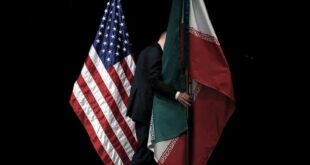 TEHRAN (FNA)- Global financial crisis has made it highly unlikely for the US or Israel to take a military action against Iran to give up its nuclear program.
TEHRAN (FNA)- Global financial crisis has made it highly unlikely for the US or Israel to take a military action against Iran to give up its nuclear program.
To strike Iranian sites now, diplomats and analysts say, would risk triggering an even more intolerable tumult should Tehran choke off oil exports – something neither US President George W. Bush nor his imminent successor looks likely to countenance.
With the UN Security Council in stalemate after Russia and China balked at initiatives to pass a fourth round of sanctions against Iran, Western powers may be forced to focus on diplomatic engagement and economic incentives instead.
That would leave Israel, which has vowed to deny Iran the means to threaten its existence, with a stark choice between launching unilateral attacks and being branded a warmonger or accepting the prospect of a still more powerful Iran.
“We have made it clear that an offensive option against Iran is not something we want contemplated at this time,” said a US diplomat who has had extensive dealings with Israel.
Some analysts suggest Israel could strike after the November 4 US election but before Barack Obama or John McCain becomes president in January, to avoid alienating American voters while capitalizing on the parting largesse of the Bush White House.
Yet, some observers believe that there are already signals of a softening in Washington’s hard line on Iran, which insists its atomic ambitions are peaceful.
Others view the measure as a move to buy more votes for the Republicans in the upcoming presidential elections in the US.
Sam Gardiner, a retired US air force colonel who runs wargames for government agencies, said the banking meltdown and non-Middle Eastern crises such as the Russian-Georgian conflict and escalating American operations against al Qaeda targets on the Pakistan-Afghanistan border had overhauled American agendas.
Whether the new president is the conciliatory Obama or more hawkish McCain, he will inherit foreign policy priorities that stress containment or cooperation on Iran, Gardiner said.
“The consensus among American decision-makers is that bombing Iran is not the right path. I see players being more and more cautious about the consequences to fragile economies of an oil spike,” Gardiner said.
US military commanders have long voiced misgivings about the idea of opening a front with Iran that would sap the resources of their protracted campaigns in Iraq and Afghanistan.
Though they have the planes needed for massive bombing runs, the Americans’ budgets, gutted by government bank bailouts, may find it hard to fund a new war – especially if ground troops are dragged in or if Iran responds by chocking the Persian Gulf.
“It stands to reason that it (an offensive against Iran) would be expensive, and they (US forces) are already doing a lot,” said Mark Stoker, a defense economist at the International Institute for Strategic Studies in London.
One effect of the international money woes has been the sudden slashing of oil costs by more than half from their July peak of $147 a barrel.
Like Bush, Obama and McCain have said military force should remain an option.
But Gardiner predicted the next White House would opt first of all to toughen up sanctions with Russia coaxed on board.
Few experts see Israel wanting to be blamed abroad for single-handedly driving oil costs back up or drawing Iranian reprisals against US and Israeli assets in the Persian Gulf and all around the Middle-East.
“A direct attack on Iran would be costly,” said an Israeli diplomat.
Outgoing Israeli Prime Minister Ehud Olmert has dismissed calls by some of his cabinet colleagues for a unilateral attack on Iran as “megalomania,” saying on September 29 that Israel must “act within the envelope of the international system.”
That, diplomats said, referred to the Olmert government’s lobbying of foreign powers while sustaining the specter of war via media leaks about Israeli military readiness to hit Iran.
Olmert’s heir-apparent, Foreign Minister Tzipi Livni, may prove to be even more gun-shy. The Israeli newspaper Haaretz reported last year that she had privately voiced doubts whether a nuclear Iran could threaten the survival of Israel, which is believed to have the Middle East’s only atomic arsenal.
Israel and its close ally the United States accuse Iran of seeking a nuclear weapon, while they have never presented any corroborative document to substantiate their allegations. Both Washington and Tel Aviv possess advanced weapons of mass destruction, including nuclear warheads.
Iran vehemently denies the charges, insisting that its nuclear program is for peaceful purposes only. Tehran stresses that the country has always pursued a civilian path to provide power to the growing number of Iranian population, whose fossil fuel would eventually run dry.
Speculation that Israel could bomb Iran has mounted since a big Israeli air drill in June. In the first week of June, 100 Israeli F-16 and F-15 fighters reportedly took part in an exercise over the eastern Mediterranean and Greece, which was interpreted as a dress rehearsal for a possible attack on Iran’s nuclear installations.
Iran has, in return, warned that it would target Israel and its worldwide interests in case it comes under attack by the Tel Aviv.
The United States has also always stressed that military action is a main option for the White House to deter Iran’s progress in the field of nuclear technology.
Iran has warned it could close the strategic Strait of Hormoz if it became the target of a military attack over its nuclear program.
Strait of Hormoz, the entrance to the strategic Persian Gulf waterway, is a major oil shipping route.
Intensified threats by Tel Aviv and Washington of military action against Iran contradict a recent report by 16 US intelligence bodies which endorsed the civilian nature of Iran’s nuclear plans and activities.
Following the US National Intelligence Estimate (NIE) and similar reports by the IAEA head – one in November and the other one in February – which praised Iran’s truthfulness about key aspects of its past nuclear activities and announced settlement of outstanding issues with Tehran, any effort to impose further sanctions or launch military attack on Iran seems to be completely irrational.
The February report by the UN nuclear watchdog, the International Atomic Energy Agency, praised Iran’s cooperation in clearing up all of the past questions over its nuclear program, vindicating Iran’s nuclear program and leaving no justification for any new UN sanctions.
The UN nuclear watchdog has also carried out at least 14 surprise inspections of Iran’s nuclear sites so far, but found nothing to support West’s allegations.
Following the said reports by the US and international bodies, many world states have called the UN Security Council pressure against Tehran unjustified, demanding that Iran’s case be normalized and returned from the UNSC to the IAEA.
Meantime, a recent study by the Institute for Science and International Security (ISIS), a prestigious American think tank, has found that a military strike on Iran’s nuclear facilities “is unlikely” to delay the country’s program.
The ISIS study also cautioned that an attack against Iran would backfire by compelling the country to acquire nuclear weaponry.
 Eurasia Press & News
Eurasia Press & News

